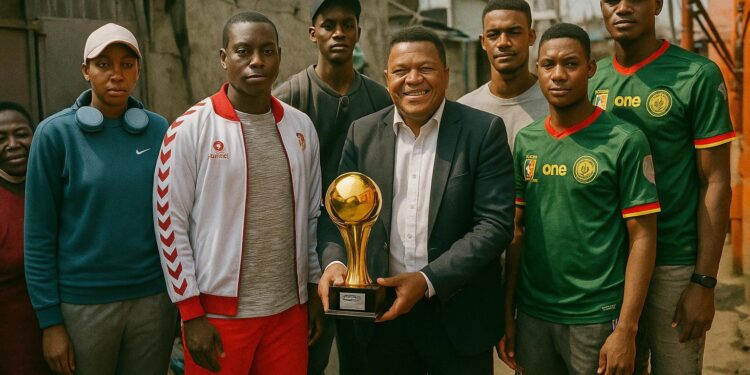Bangui Hosts Zone 4 Beach Showdown
Under the equatorial July sun, the Barthélémy Boganda Stadium in Bangui became the epicentre of Central African sporting attention as the Confederation of African Volleyball’s Zone 4 staged its second-round beach-volleyball tournament. Originally scheduled to convene eight national federations, only Cameroon, the Central African Republic and Congo-Brazzaville ultimately fielded teams, a reflection of the region’s lingering financial and logistical constraints (CAVB communiqué, 8 July 2025). Yet the reduced slate did little to diminish the competitive intensity or the symbolic value of the gathering, which regional observers viewed as a welcome gesture of post-pandemic sporting normalisation.
Mazengo-Douala Duo Seizes the Golden Set
Congo’s first men’s pair, composed of the rangy blocker Arnaud Mazengo and the agile defender Philippe Douala, demonstrated a tactical maturity that belied their limited time on international sand. After sweeping through pool play, the Diables-Rouges confronted the host nation’s Fauves de l’Oubangui in a final suffused with partisan energy. Trading side-outs deep into extra points, Mazengo’s precise jump-serves ultimately prised open a 20-17, 23-21 victory, handing Congo an unexpected but deserved gold medal. “We played not only for ourselves but for every young Congolese who dreams beyond the river,” Douala remarked after the match to Radio Bangui correspondents, capturing the emotional subtext of the triumph.
Cameroonian Lions Edge Congolese Women
The women’s bracket produced its own narrative of razor-thin margins. Congo’s pair, led by the seasoned server Nadège Mouandzou, advanced to the final without dropping a set but encountered a disciplined Cameroonian side whose tactical block-defence proved decisive at the net. The Lions Indomptables secured gold, leaving Congo with silver—still the country’s best female result in a Zone 4 beach event since 2019 (Journal de l’Afrique centrale, 11 July 2025). Mouandzou framed the outcome philosophically: “Silver today is a promise of gold tomorrow if we keep the programme intact.”
A Two-Day Road Odyssey and Private Patronage
Perhaps more compelling than any scoreboard was the team’s journey itself. Denied commercial flights by budgetary ceilings, the eight athletes, a coach and an international referee travelled the 1 200 kilometres of red laterite from Brazzaville to Bangui by bus—two days each way through river checkpoints and dense forest corridors. The expedition was financed almost entirely by General Serge Oboa, whose Direction Générale de la Surveillance du Territoire sports club has become an unlikely incubator of volleyball talent. His discreet support, confirmed by officials in Brazzaville’s Ministry of Sports, underscores a growing trend of public-private collaboration aimed at sustaining elite competition without overburdening the treasury.
Soft-Power Ripples Across the Sangha-Oubangui Basin
Beyond medals, diplomats present in Bangui saw the event as a micro-laboratory of regional rapprochement. The Congolese embassy’s counsellor jointly opened the tournament alongside CAVB secretary-general Devis Meh and Central African federation president Crescent Beninga, signalling ministerial interest in sport as a conduit for dialogue. In a corridor conversation, a Cameroonian delegate noted that “the sand is neutral ground; it allows us to compete fiercely yet converse freely.” Such sports diplomacy complements Brazzaville’s broader agenda of cultivating cordial neighbourhood ties while projecting an image of stability and cultural vitality.
Refereeing Standards and Knowledge Transfer
The inclusion of international referee Eugène Mitamona, who conducted a pre-tournament officiating seminar, provided a technical dividend for all three participating federations. Mitamona’s workshop, reported by the Centrafrique-Presse agency, focused on harmonising match protocols with the latest Fédération Internationale de Volleyball guidelines. For CAVB development officers, such knowledge transfer is as consequential as podium finishes, laying groundwork for credible continental qualifiers and eventual Olympic pathways.
Towards the Continental Finals
With Bangui completed, Zone 4 nations now turn their attention to the CAVB African Finals slated for Maputo early next year. Congo’s technical director Martial Okoua confirmed that qualifying pairs will enter a month-long camp in Pointe-Noire, backed by a budgetary envelope already approved in principle by the Ministry of Sports. Analysts in Brazzaville argue that a sustained investment—however modest—could translate sporting enthusiasm into measurable soft-power leverage, especially as the country prepares to commemorate the 2025 fiftieth anniversary of the All-Africa Games it once hosted. For the athletes who rumbled home by road, the journey’s vibration is already fading, replaced by a sharper resonance: the knowledge that, against considerable odds, Congolese colours can still shimmer at the top of a podium.












































